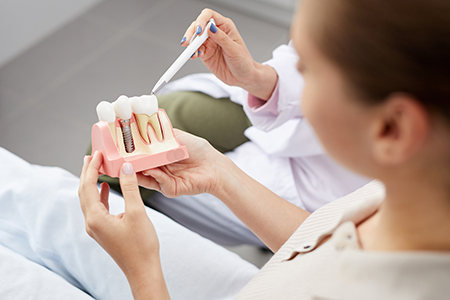
Our Office
2615 West 24th St.
Plainview, TX 79072
Existing Patients: (806) 296-6057
New Patients: (806) 217-7472
Visit Us Online

Missing teeth affect more than how you look — they influence how you eat, speak, and how your jaw ages over time. Whether you lost a tooth to decay, gum disease, or an accident, modern implant dentistry offers a dependable way to restore function and appearance. Dental implants act like artificial roots that anchor replacement teeth securely, helping preserve bone and facial structure while returning confidence to everyday moments like laughing or sharing a meal.
Implants are appropriate for many situations: replacing a single tooth, stabilizing a denture, or restoring a full arch of teeth. The treatment is tailored to each patient’s oral health, medical history, and long-term goals. With careful planning and the right treatment team, implants can deliver results that look natural and perform like a patient’s original teeth.
At Texas Super Smiles for Kids, we focus on clear communication and step-by-step planning so families understand what to expect from consultation through recovery. Our aim is straightforward: to help patients rebuild comfortable, long-lasting smiles that support everyday life.

A dental implant is a small, biocompatible post surgically set into the jawbone. Over time, bone grows around the implant in a process called osseointegration, producing a rock-solid foundation. This makes implants distinct from other tooth-replacement options that rest on the gums or rely on neighboring teeth for support.
Once integrated, an implant can support a single crown, a multi-tooth bridge, or an entire arch of replacement teeth. Because they replace both root and crown, implants restore chewing efficiency and reduce the risk of bone loss that typically follows tooth extraction.
Patients often notice improved stability and comfort compared with removable solutions. For many, implants mean fewer food restrictions, steadier speech, and a return to routine dental care habits similar to natural teeth.
Dental implants are prized for their reliability and longevity. With precise placement and good oral hygiene, they can remain functional for many years. The implant’s design and the material choices used for restorations are intended to blend durability with a natural look and feel.
Beyond function, implants protect oral health: they help maintain the jawbone and preserve the positions of neighboring teeth by filling the gap left by a missing tooth. That prevention of shifting helps maintain proper bite alignment and can reduce the need for other restorative procedures down the road.
For people who wear dentures, implants frequently eliminate the frustration of slippage and adhesives. Implant-supported restorations provide steadier, more predictable performance during everyday activities such as eating and speaking.

A single-tooth implant replaces one missing tooth with an individual implant and crown. This option restores a natural bite without altering neighboring teeth for support. Because it stands on its own, a single implant preserves adjacent tooth structure and provides a comfortable, long-term replacement.
When two or more adjacent teeth are missing, implant-supported bridges can provide a stable solution without relying on natural teeth as anchors. Strategically placed implants bear the load of the replacement teeth, protecting remaining healthy teeth from unnecessary preparation.
For patients who need to restore a full upper or lower arch, modern workflows allow for fixed implant bridges or implant-retained dentures. Fixed options can give the feel of permanent teeth that don’t come out at night, while implant-retained overdentures use attachments to secure a removable prosthesis more reliably than conventional dentures.
Both approaches aim to restore chewing function and facial support. They are planned based on bone volume, jaw anatomy, and the patient’s goals for function and aesthetics. In many cases, temporary teeth can be provided during healing so patients leave treatment with an attractive, functional smile.
Careful planning sets the stage for predictable implant outcomes. Initial visits typically include a thorough dental exam, diagnostic imaging, and a review of medical history to determine suitability for implants. Treatment plans are personalized and may include preliminary steps such as tooth extractions, bone grafting, or other site preparation when needed.
Implant placement is generally performed as an outpatient procedure. While patient experience varies, most people tolerate implant surgery well and return to normal activities within a few days. Healing time allows the implant to fuse with the bone; once stability is achieved, the final restoration — crown, bridge, or denture — is attached to complete the smile.
Throughout the process, the clinical team provides guidance on anesthesia options, preoperative instructions, and aftercare to support healing and long-term success. Clear communication about timelines and follow-up care helps patients feel informed and prepared at each stage.
Bone volume and density at the implant site influence how implants are placed and whether grafting is necessary. When teeth are lost, nearby bone gradually resorbs without stimulation. In many cases, a simple bone graft or socket preservation procedure can rebuild the foundation needed for a stable implant.
Bone grafting techniques vary from minor grafts placed at the time of extraction to staged grafts completed before implant placement. These procedures are common and are intended to provide predictable support for the implant while preserving facial form and function.
Once implants are in place, routine oral hygiene and regular professional exams remain essential. Implants resist decay, but the surrounding gum and bone are still vulnerable to inflammation if plaque accumulates. Patients are encouraged to maintain consistent brushing, flossing, and dental visits to help preserve implant health.
Periodic follow-up appointments let clinicians monitor integration, prosthesis condition, and soft-tissue health. Simple preventive care and early interventions when needed are key to preserving the function and appearance of implant restorations over time.

If you are considering implant dentistry, a consultation will identify your options and outline a personalized plan. Our team will review diagnostic images, discuss any preparatory treatments, and explain each phase of care so you can make an informed decision that fits your oral-health goals.
Implants are a durable and versatile way to restore missing teeth and can significantly improve comfort, function, and appearance for many patients. When paired with thoughtful planning and ongoing care, they offer a long-term solution that supports both health and confidence.
Dental implants are a proven method for replacing missing teeth with solutions that feel and function like natural dentition. From single-tooth restorations to full-arch reconstructions, implant dentistry addresses a wide range of needs while helping preserve bone and facial structure. The process emphasizes careful evaluation, individualized planning, and follow-up care to support durable results.
If you’d like to explore implant options for you or a family member, contact us to learn more about the steps involved and to schedule an evaluation. Our team at Texas Super Smiles for Kids is ready to answer questions and help guide you toward the best path for rebuilding a healthy, confident smile.
If you've lost a tooth due to injury, decay, gum disease, or any other reason, we recommend dental implants to replace missing teeth. Dental implants come the closest to replicating the look, feel, and function of your natural teeth.
Dental implants are placed into the jawbone and mirror the same function as the root of a tooth. The procedure for dental implants is usually performed while a patient is sedated. Patients who undergo IV sedation must have an empty stomach and transportation home following the procedure. Most sedation patients will have little to no memory of the procedure occurring.
Generally, dental implants are made out of a biocompatible metal such as titanium. Biocompatible metals are also used for other common bone implants (such as shoulder, hip, and knee replacements). The visible portion of the implant is usually made out of porcelain and is custom-made to match your existing teeth.
Dental implants are designed to fuse to the bone, which makes them become permanent fixtures. Typically speaking, the success rate is nearly 100%. There are few cases in which the implant will not fuse as intended and must be removed. If this happens to occur, the procedure can be attempted again a few months later.
Dental implants are not usually covered by dental insurance, but may be covered under a patient's medical insurance. Our office and your insurance company can discuss coverage options with you based on your individual case and treatment plan.
It's easy... just take care of an implant as if it's a natural tooth! This involves regular brushing, flossing, and dental checkups. If you have any concerns about your implant, contact us immediately.
